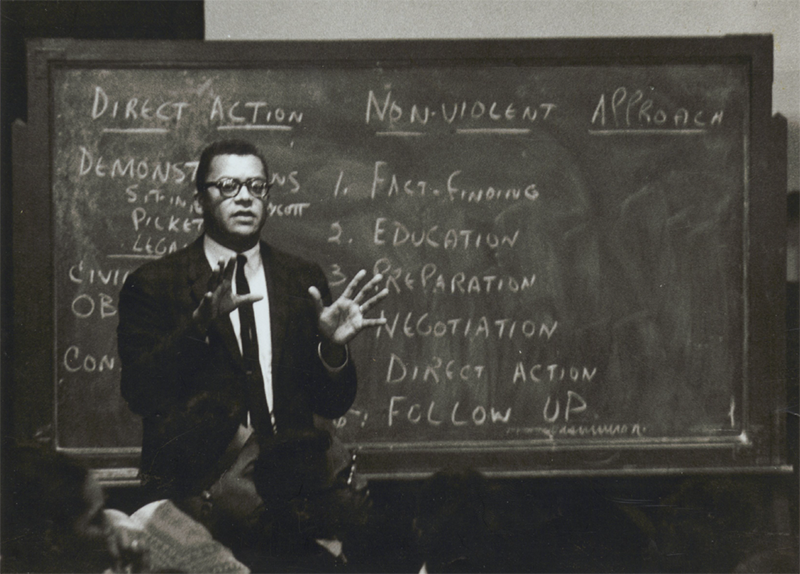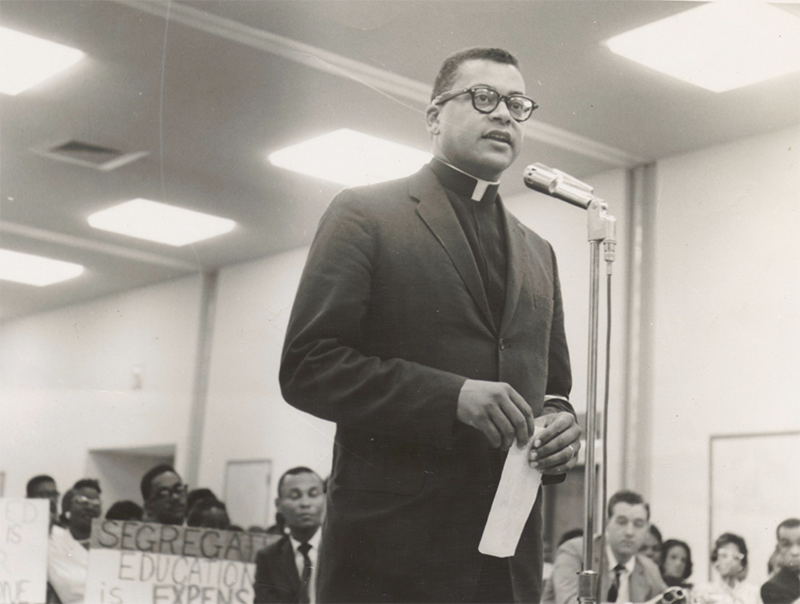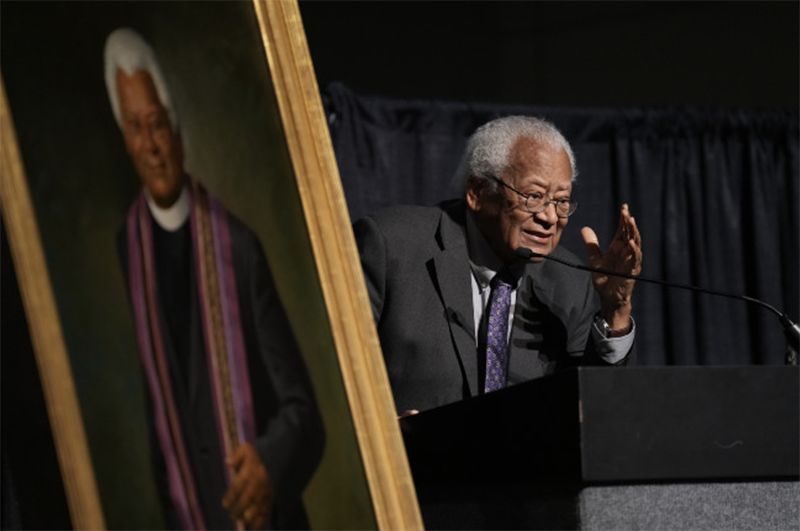Lawson, an architect of the U.S. nonviolence movement, died June 9 at 95

(The Rev. James M. Lawson Papers/Vanderbilt University Special Collections)
The Jean and Alexander Heard Libraries’ Special Collections and University Archives has fully digitized the Rev. James M. Lawson Papers and made these materials available to the general public, giving students, scholars and historians a more complete picture of the distinguished activist’s life and legacy. The collection is available online through the JSTOR digital library of academic journals, books and primary sources.
Lawson, a key figure of the Civil Rights Movement who shared a complex and formative history with Vanderbilt University, donated a significant portion of his personal papers to Heard Libraries’ Special Collections in 2013. Since the papers’ conversion to a fully digital collection in December 2023, they have quickly become the Heard Libraries’ most-accessed online collection.
“Rev. Lawson was a witness to—and a vital participant in—many pivotal moments in our nation’s history and the struggle for civil rights. His leadership resonates powerfully today,” University Librarian Jon Shaw said. “Heard Libraries is honored to serve as the repository of the Rev. James M. Lawson Papers and to make this valuable resource more widely available so that others around the globe can learn from Rev. Lawson’s inspiring work and example.”
As a Methodist missionary to India in the 1950s, Lawson studied satyagraha, a form of nonviolent resistance developed by Mahatma Gandhi and his followers. After returning to the U.S. to begin his theological studies, Lawson was urged by the Rev. Martin Luther King Jr. to relocate to the South to teach the strategies of civil resistance to young activists there. Lawson entered Vanderbilt Divinity School as a transfer student in 1958 and soon began teaching nonviolent protest techniques to local college students in Nashville.
From this effort came the Nashville Student Movement, which organized sit-ins to desegregate the city’s downtown lunch counters. Upon learning of his leadership role in planning the demonstrations, Vanderbilt’s Board of Trust voted to expel Lawson from the university—a move that generated national headlines and prompted some faculty members to resign in protest. A compromise was reached to allow Lawson to complete his Vanderbilt studies, but he chose instead to transfer to Boston University, where he received a graduate degree in 1960.
While in Nashville, Lawson met and mentored many of the future leaders of the Civil Rights Movement, including Diane Nash, James Bevel, Bernard Lafayette and John Lewis. Lawson and his students played central roles in the Freedom Rides, the March on Washington, the Selma to Montgomery marches and more. By highlighting racial injustice, they contributed significantly to the passage of landmark federal legislation, including the Civil Rights Act of 1964 and the Voting Rights Act of 1965.
“In spite of certain events of the 1960s, Vanderbilt’s vision and I have never broken step,” Lawson said in 2013. “In light of the ‘Great Movement’ that happened in Nashville, I hope that Vanderbilt will become a major center for the study of the nonviolent direct-action campaigns of 1953–1980 and the moral and social earthquake those campaigns caused.”

Lawson, whom King once described as “the leading nonviolence theorist in the world,” went on to serve as a pastor in Memphis, Tennessee, and represented Black workers during the Memphis sanitation strike of 1968. Lawson invited King to Memphis to speak on the workers’ behalf, and it was there that King delivered his “I’ve Been to the Mountaintop” speech on the eve of his death in April 1968.
In 1974 Lawson moved to Los Angeles, where he was pastor of Holman United Methodist Church for 25 years, all the while continuing his teaching and civil rights work. Lawson and Vanderbilt University eventually reconciled, and in 1996, he received the Divinity School’s inaugural Distinguished Alumni/ae Award. Lawson was named the 2002 Walter R. Murray Jr. Distinguished Alumnus by the Association of Vanderbilt Black Alumni, and in 2005, he was recognized with the Vanderbilt Alumni Association’s Distinguished Alumni Award.
Lawson returned to Vanderbilt to teach as a Distinguished University Professor from 2006 to 2009, and in 2007 the university established the James M. Lawson Jr. Chair. A scholarship for undergraduate students at Vanderbilt was named in his honor in 2018, the same year he was made a Vanderbilt Trailblazer.
In 2021, Vanderbilt Divinity School and the College of Arts and Science established the James Lawson Institute for the Research and Study of Nonviolent Movements. Drawing on rich local history, the institute aims to nurture evidence-based research and education rooted in nonviolent strategies, create and deepen partnerships within Nashville, and develop leaders who, like Lawson, contribute to a thriving society. The institute regularly hosts public workshops, seminars and learning opportunities to equip the next generation of community organizers with the skills to make meaningful, sustainable change.

(John Russell/Vanderbilt University)
The digitized Rev. James M. Lawson Papers complement this work and broaden the reach of the organization far beyond Nashville, said Phillis Isabella Sheppard, executive director of the James Lawson Institute and E. Rhodes and Leona B. Carpenter Professor of Religion, Psychology and Culture at Vanderbilt.
“Rev. Lawson’s papers are important to the research mission of the institute and, of course, Vanderbilt University,” Sheppard said. “We know that to advance the legacy and efficacy of nonviolent direct action, we must research successful efforts and those where maintaining a nonviolent campaign have been challenged. In collaboration with Heard Libraries, we nurture both researchers and students in the method and knowledge of Rev. Lawson’s teachings on nonviolence.”
The effort to digitize the Rev. James M. Lawson Papers and make them available to the public builds on the collection’s—and Heard Libraries’—global reach. Director Karen Hayes has utilized the papers in the making of her authorized documentary feature film, A Better Way: James Lawson, Architect of Nonviolence, currently in production. And in a full-circle moment, Indian biographer and historian Rajmohan Gandhi, the grandson of Mahatma Gandhi, visited Special Collections and University Archives in December 2023 to view the Lawson papers as part of his research on civil disobedience and reconciliation.
The Rev. James M. Lawson Papers join others in Vanderbilt’s Special Collections donated by significant figures of the Civil Rights Movement. These include the papers of the Rev. Kelly Miller Smith, assistant dean of Vanderbilt Divinity School from 1968 to 1984 who helped organize the Nashville Christian Leadership Council and worked directly with Lawson, and John L. Seigenthaler, an eminent journalist and founder of the First Amendment Center who served as a special aide to former U.S. Attorney General Robert F. Kennedy.